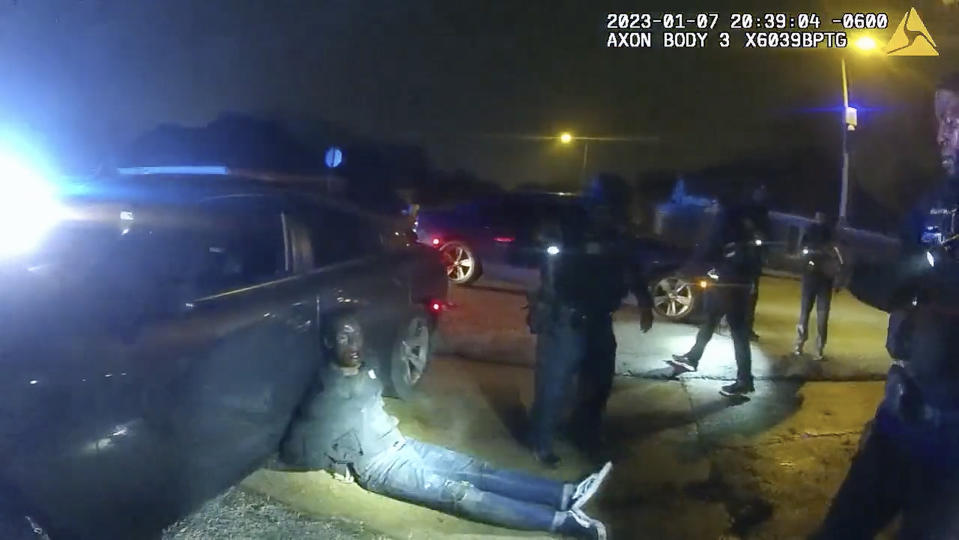Prosecutors detail possible expert witnesses in federal case against officers in Tyre Nichols death
MEMPHIS, Tenn. (AP) — Memphis Police Department trainers are prepared to testify in the federal civil rights case against four former Memphis police officers in the fatal beating of Tyre Nichols that the officers used force inconsistent with their training and failed to prevent their colleagues from hurting him, court documents showed.
Meeting a judge's deadline, prosecutors revealed in court filings Wednesday potential avenues of trial testimony from Memphis Police Department training instructors, at least one of whom, Juan Gonzalez, taught the officers charged in Nichols’ death.
Police video showed officers yanked Nichols out of his car during the traffic stop on Jan. 7, 2023, after he was pulled over for alleged reckless driving. Nichols was pepper-sprayed and hit with a stun gun, but he managed to get away and run toward his house nearby. Officers caught up with Nichols and punched him, kicked him and hit him with a police baton, video showed. He died three days later at a hospital.
Memphis' police chief has said that the department couldn’t substantiate any reason for the stop.
Prosecutors said Gonzalez has taught for more than two decades at the training academy. If permitted, Gonzalez will testify that the force used on Nichols was inconsistent with their 21-week police academy training and subsequent field training, prosecutors said.
“Mr. Gonzalez will testify, for example, that the officers should have asked Tyre Nichols for his license and registration rather than immediately pulling him out of his car,” the filing said.
Gonzalez also plans to testify that the officers who beat Nichols used force that was not part of their training. They were taught “to use manipulation techniques to control the subject, not to hurt them,” the filing said.
“Defendants should have cuffed Nichols, called a lieutenant, called the fire department, and put Nichols in the back seat of a police car ... the punches, kicks, and baton strikes captured on video were inconsistent with the containment and cuffing techniques that MPD taught,” prosecutors said.
The list of potential witnesses was presented by prosecutors in the federal civil rights case against Tadarrius Bean, Demetrius Haley, Emmitt Martin and Justin Smith. They, along with a fifth former Memphis officer, Desmond Mills Jr., were fired after Nichols' death.
The five were indicted in September on federal charges that they deprived Nichols of his rights through excessive force and failure to intervene, and obstructed justice through witness tampering. They also have been charged in state court with second-degree murder.
Mills pleaded guilty to federal charges in November. Mills also intends to plead guilty in state court and could testify against his four ex-colleagues, who have pleaded not guilty.
Nichols was Black. The five officers also are Black. The four who remain charged face federal trial in May and state court trial in August.
Haley's lawyer had filed a motion asking U.S. District Judge Mark Norris to exclude expert testimony at the federal trial. Michael Stengel argued that prosecutors missed a deadline to say they were seeking expert testimony. The motion said prosecutors told Stengel that “the United States does not at this time intend to introduce any expert testimony,” but they would advise him should that change.
Stengel asked Norris to bar prosecutors from using experts to discuss Nichols' cause of death, toxicology and DNA test results, whether the officers used unreasonable force, and whether any “alleged force” used against Nichols resulted in his injury or death.
Norris had ordered prosecutors to produce a list of proposed expert witnesses by Wednesday, but he has not ruled on the motion by Haley's lawyer.
Prosecutors said another possible witness, retired police department legal advisor and instructor Zayid Saleem, plans to testify he taught officers that they could be prosecuted or sued for failing to intervene and prevent another officer from using excessive force.
Saleem discussed with officers the case of George Floyd, a Black man who died in May 2020, after a white officer kneeled on his neck on the street outside a Minneapolis convenience store, prosecutors said. The officer, Derek Chauvin, pleaded guilty to a federal civil rights charge, and three other officers were convicted in a 2022 federal trial of violating Floyd’s civil rights.
Saleem “specifically addressed the fact that the officer who used force on Mr. Floyd was convicted of a crime and the officers who stood by and watched the incident also were found guilty,” the filing said.
Prosecutors also may call doctors who could testify about Nichols' medical condition, including one who was a consulting physician Nichols while he was hospitalized.
The U.S. Department of Justice has opened a “patterns and practices” investigation into how Memphis officers use force and conduct arrests, and whether the department in the majority-Black city engages in racially discriminatory policing.



